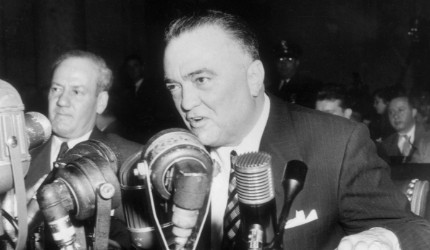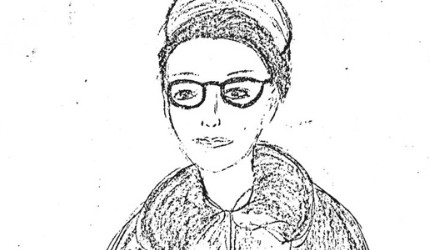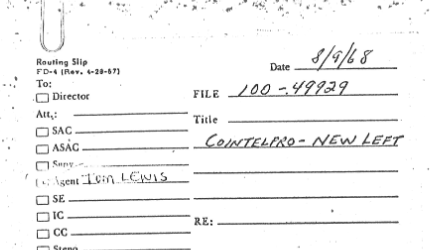Alex Constantine - February 1, 2014
The night of March 8, 1971 was the night for the “Fight of the Century” – Muhammad Ali versus Joe Frazier – at New York’s famed Madison Square Garden.
Millions of fans around the country were glued to their radios to hear the broadcast – millions, that is, except for eight unlikely burglars, who used the fight as the perfect distraction for their infiltration of J. Edgar Hoover’s feared FBI.
Using lock picks and crowbars, the activists – among them a young married couple with children, a cab driver, and a religion professor – broke into a suburban Pennsylvania FBI office.
Despite a massive FBI manhunt, the burglars were never caught; the statute of limitations ran out, and their identities were never known. Until now.
Journalist Betty Medsger was the first to report the story, and she's just published her book called "The Burglary: The Discovery of J. Edgar Hoover's Secret FBI." She writes that long before Edward Snowden and his leaks about the U.S. National Security Agency, American activists believed that there was government malfeasance that needed to be made public.
“J. Edgar Hoover was untouchable,” John Raines, who along with his wife Bonnie was an accomplice in the break in, told CNN’s Christiane Amanpour on Monday. “He was either admired or he was feared in Washington. Nobody that we elected to supervise something like the FBI would do their work.”

“The motivation really came out of my early participation in the civil rights movement,” John Raines said. “I was a Freedom Rider. We were made very much aware, those of us involved in the civil rights movement, that J. Edgar Hoover's FBI did not want that movement to succeed.”
Their break-in would be a success, and the documents they found confirmed their fears.
One FBI memo, calling for more surveillance of anti-war activists, read “It will enhance the paranoia endemic in these circles and will further serve to get the point across there is an FBI agent behind every mailbox.”
Meticulous planning
Before fight night, the activists knew that they needed to know all about the building they were targeting.
Bonnie Raines stepped forward for the job. She posed as a student from nearby Swarthmore College, and said she was doing research on “opportunities for women in the FBI, and could I come in and interview the head of the office.”
When they gave her an appointment, she disguised herself as a college student – she was 29 at the time – and went in.

“I took my notes in my little notebook with gloves on,” she said – so as not to leave fingerprints. “They never noticed that I never took my gloves off the whole time I was there.”
The fact that they showed her so little suspicion, she told Amanpour, showed the instigators that they would be able to break in without issue.
“I want to emphasize,” Medsger added, “that they had no idea whether they would find a single piece of paper of importance. And I think this is important. They were willing to take this risk that could have led to many years in prison, sacrificing their freedom, without having any certainty that they were going to find anything significant.”
“And this is quite in contrast with the methods used by Edward Snowden today, when he's an insider. They were an outsider.”
Risking the children
In breaking into an FBI office, the Raineses were taking a huge risk not only for themselves, but for their young children.
The fact that they would both participate in the break-in, Bonnie admitted, was “another level of jeopardy.”
“We were not reckless in any regard,” she said.
They felt that it was their “responsibility as citizens to take this action, even as the parents of young children.”
Had they been caught, John said, they had arranged for his older brother to care for the children.
“We're parents; we're also citizens,” he said. They had a responsibility as parents to their children, but also “as citizens to the nation those children are going to live in and have children in.”
Choosing the right night
Breaking in on the night of the highly anticipated Frazier-Ali fight, Bonnie said, was the “key factor.”
Bill Davidon, a physics professor and one of their fellow accomplices “who was so strategic and smart, realized that we had an opportunity.”
“It was our hope that people living in apartments in that building would be listening to it on their radio and perhaps the police would not be quite as vigilant – they would be listening to the fight as well.”
And it worked.
Collecting a bounty
Departing the building weighed down with documents, the burglars jumped into a station wagon and drove to a nearby Quaker farmhouse.
They set up tables, and immediately set to work sorting through the papers, not knowing what they might come across.
“Somebody would say, ‘Oh, oh, oh, look at this! Look at this!,’” John said. “And we'd all run over there and, you know, it was within an hour, we knew we hit the jackpot.”
One of the documents they found was an internal memo on “COINTELPRO,” or “counterintelligence programs.”

“It was advice on how university administrators should come down hard on student protesters,” Medsger said. “It was really one of the most vicious of Hoover's operations and it would involve dirty tricks, some of them violent, some of them resulted in death.”
The notorious FBI surveillance of Martin Luther King, Jr., for example, fell under COINTELPRO.
“The program against Dr. King went on for years,” Medsger said. They tried, for example, “to convince him to commit suicide just days before he was to receive the Nobel Peace Prize.”
The burglars would meet with vindication when, a few years later, a Senate investigation – the Church Committee – released its report on government surveillance.
“Too many people have been spied upon by too many government agencies, and too much information has been collected,” the report read.
History repeats
It draws striking parallels to today.
President Barack Obama is expected to lay out reforms to the NSA, after a special panel investigating Edward Snowden’s leaks called for new limited on the nation’s intelligence agencies.
“Surveillance, it seems to me, is very different now than it was then. It was much easier for the public to react then,” Medsger said.
The activist groups of the 1960s and ‘70s “felt the paranoia” that the government was trying to create, she said.
“You wondered about the person next to you being an informer. Then it was revealed that, that and much worse was true in terms of the surveillance and the dirty tricks taking place.”
Compare that to today, when Medsger said that the surveillance is “much more massive” but harder for the public “to feel surveillance.”
“It really involves everyone,” she said, “and the technological capacity is so great, that it makes it much more personally invasive, but you don’t feel it.”
http://amanpour.blogs.cnn.com/2014/01/14/after-43-years-fbi-burglars-come-clean/








